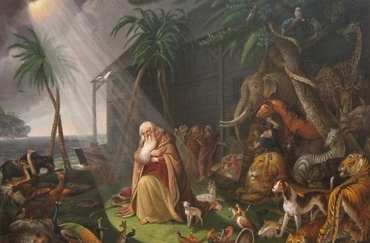1
E l’Eterno parlò a Mosè, dicendo:
2
"Di’ ai figliuoli d’Israele che tornino indietro e s’accampino di rimpetto a Pi-Hahiroth, fra Migdol e il mare, di fronte a Baal-Tsefon; accampatevi di faccia a quel luogo presso il mare.
3
E Faraone dirà de’ figliuoli d’Israele: Si sono smarriti nel paese; il deserto li tiene rinchiusi.
4
E io indurerò il cuor di Faraone, ed egli li inseguirà; ma io trarrò gloria da Faraone e da tutto il suo esercito, e gli Egiziani sapranno che io sono l’Eterno". Ed essi fecero così.
5
Or fu riferito al re d’Egitto che il popolo era fuggito; e il cuore di Faraone e de’ suoi servitori mutò sentimento verso il popolo, e quelli dissero: "Che abbiam fatto a lasciar andare Israele, sì che non ci serviranno più?"
6
E Faraone fece attaccare il suo carro, e prese il suo popolo seco.
7
Prese seicento carri scelti e tutti i carri d’Egitto; e su tutti c’eran de’ guerrieri.
8
E l’Eterno indurò il cuor di Faraone, re d’Egitto, ed egli inseguì i figliuoli d’Israele, che uscivano pieni di baldanza.
9
Gli Egiziani dunque li inseguirono; e tutti i cavalli, i carri di Faraone, i suoi cavalieri e il suo esercito li raggiunsero mentr’essi erano accampati presso il mare, vicino a Pi-Hahiroth, di fronte a Baal-Tsefon.
10
E quando Faraone si fu avvicinato, i figliuoli d’Israele alzarono gli occhi: ed ecco, gli Egiziani marciavano alle loro spalle; ond’ebbero una gran paura, e gridarono all’Eterno.
11
E dissero a Mosè: "Mancavan forse sepolture in Egitto, che ci hai menati a morire nel deserto? Perché ci hai fatto quest’azione, di farci uscire dall’Egitto?
12
Non è egli questo che ti dicevamo in Egitto: Lasciaci stare, che serviamo gli Egiziani? Poiché meglio era per noi servire gli Egiziani che morire nel deserto".
13
E Mosè disse al popolo: "Non temete, state fermi, e mirate la liberazione che l’Eterno compirà oggi per voi; poiché gli Egiziani che avete veduti quest’oggi, non li vedrete mai più in perpetuo.
14
L’Eterno combatterà per voi, e voi ve ne starete queti".
15
E l’Eterno disse a Mosè: "Perché gridi a me? Di’ ai figliuoli d’Israele che si mettano in marcia.
16
E tu alza il tuo bastone, stendi la tua mano sul mare, e dividilo; e i figliuoli d’Israele entreranno in mezzo al mare a piedi asciutti.
17
E quanto a me, ecco, io indurerò il cuore degli Egiziani, ed essi v’entreranno, dietro a loro; ed io trarrò gloria da Faraone, da tutto il suo esercito, dai suoi carri e dai suoi cavalieri.
18
E gli Egiziani sapranno che io sono l’Eterno, quando avrò tratto gloria da Faraone, dai suoi carri e dai suoi cavalieri".
19
Allora l’angelo di Dio, che precedeva il campo d’Israele, si mosse e andò a porsi alle loro spalle; parimente la colonna di nuvola si mosse dal loro fronte e si fermò alle loro spalle;
20
e venne a mettersi fra il campo dell’Egitto e il campo d’Israele; e la nube era tenebrosa per gli uni, mentre rischiarava gli altri nella notte. E l’un campo non si accostò all’altro per tutta la notte.
21
Or Mosè stese la sua mano sul mare; e l’Eterno fece ritirare il mare mediante un gagliardo vento orientale durato tutta la notte, e ridusse il mare in terra asciutta; e le acque si divisero.
22
E i figliuoli d’Israele entrarono in mezzo al mare sull’asciutto; e le acque formavano come un muro alla loro destra e alla loro sinistra.
23
E gli Egiziani li inseguirono; e tutti i cavalli di Faraone, i suoi carri e i suoi cavalieri entrarono dietro a loro in mezzo al mare.
24
E avvenne verso la vigilia del mattino, che l’Eterno, dalla colonna di fuoco e dalla nuvola, guardò verso il campo degli Egiziani, e lo mise in rotta.
25
E tolse le ruote dei loro carri, e ne rese l’avanzata pesante; in guisa che gli Egiziani dissero: "Fuggiamo d’innanzi ad Israele, perché l’Eterno combatte per loro contro gli Egiziani".
26
E l’Eterno disse a Mosè: "Stendi la tua mano sul mare, e le acque ritorneranno sugli Egiziani, sui loro carri e sui loro cavalieri".
27
E Mosè stese la sua mano sul mare; e, sul far della mattina, il mare riprese la sua forza; e gli Egiziani, fuggendo, gli andavano incontro; e l’Eterno precipitò gli Egiziani in mezzo al mare.
28
Le acque tornarono e coprirono i carri, i cavalieri, tutto l’esercito di Faraone ch’erano entrati nel mare dietro agl’Israeliti; e non ne scampò neppur uno.
29
Ma i figliuoli d’Israele camminarono sull’asciutto in mezzo al mare, e le acque formavano come un muro alla loro destra e alla loro sinistra.
30
Così, in quel giorno l’Eterno salvò Israele dalle mani degli Egiziani, e Israele vide sul lido del mare gli Egiziani morti.
31
E Israele vide la gran potenza che l’Eterno avea spiegata contro gli Egiziani; onde il popolo temé l’Eterno, e credette nell’Eterno e in Mosè suo servo.







